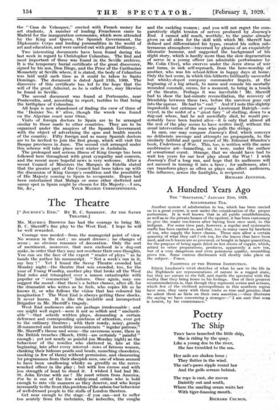The Theatre
[" JOURNEY'S END." BY R. C. SHERRIFF. AT THE SAVOY THF.ATRE.1 Ms. MAURICE BROWNE has had the courage to bring Mr. R. C. Sherriff's fine play to the West End. I hope he will be well rewarded.
Courage was needed—from the managerial point of view. No women in the cast ; no smart dresses ; no changes of scene ; no obvious romance of decoration. Only the sort of merriment, moreover, that men enclosed in a dug-out make, in order that they may not overhear their own thoughts. You can see the face of the expert " reader of plays " as he hands the author his manuscript. " Not a week's run in it, my boy 1" Yet I found the Savoy Theatre crowded last Monday night—the theatre that was crowded, too, for the year of Young Woodley, another play that broke all the West End rules and triumphed over a season catastrophic with popular or " commercial " failures. Once again, may one suggest the moral—that there's a better chance, after all, for the dramatist who writes as he feels, who copies life as he knows it, or who follows the vision that has coloured his imagination ? The West End is always getting these shocks. It never learns. It is like the invisible and incompetent Brigadier in Mr. Sherriff's tragedy.
West End audiences also are perhaps irredeemableand one might well regret—were it not so selfish and " unc:harit- able "—that soberly written plays, demanding a certain deference and corresponding quietness of attention, ever get to the ordinary theatres ; with their rowdy, noisy, grossly ill-mannered and incredibly inconsiderate " regular patrons. Mr. Sherriff's theme and scene—the cavernous scene, there in the British trenches (March, 1918)—are certainly "painful " enough ; yet not nearly so painful (on Monday night) as the behaviour of the rowdies who clattered in, late at the beginning, late after every interval—rows of fatuous women, clanking their hideous pearls and beads, munching chocolates, smoking (a few of them) without permission, and clamouring for programmes from their sheepish men, one of whom seemed to have been swallowing whisky as greedily as the nerve- wracked officer in the play ; but with less excuse and with less strength of head to stand it. I wished I had had Mr. St. John Ervine with me I He must return from America. For he is one of the few widely-read critics who is bold enough to rate vile manners as they deserve, and who keeps incessantly to the front this problem of the saloon-bar behaviour of well-dressed people in the stalls of London theatres.
Get near enough to the stage—if you can—not to suffer too acutely from the inebriates, the imbeciles, the coughs and the cackling women ; and you will not regret the corn-. paratively slight tension of nerves produced by Journey's End. 1 cannot add much, worthily, to the praise already given on all sides for the skill with which Mr. Sherriff has defined and differentiated• his types, created his sullen sub- terranean atmosphere—traversed by gleams of an exquisitely idiomatic humour, and suggested the background of his slight story, which is hardly more than the slow degeneration of nerve in a young officer (an admirable performance by. Mr. Colin Clive), who swerves under the fierce stress of war and turns, in sick self-reproach, from the hero-worship of another, who was his school-fellow in happy days at home.' Only the last scene, in which this hitherto brilliantly successful but whisky-doped company commander lingers, at the beginning of a big attack, to nurse and console his mortally wounded comrade, seems, for a moment, to bring in a touch of the theatre. Perhaps it was inevitable ! Mr. Sherriff had to show the last-minute reconciliation, the recovery of friendship between these two, before the survivor goes out into the uproar. He had to " end." And if I note this slightly improbable last entrance of young Lieutenant Raleigh—con- veyed, in the midst of a " great fury " of shelling, down to a dug-out where, had he not mercifully died, he would pre- sumably have been buried alive—it is only that almost all the rest of the play seems to have written itself, without the usual intervention of the man who pulls the strings. In sum, one may compare Journey's End, which conveys no deliberate message and attempts no propaganda, to the similarly faithful and quiet record of Mr. Edmund Blunden's book, Undertones of War. This, too, is written with the same unobtrusive art—tunnelling, as it were, under the surface of sensational event. Strange, that we should have had to wait ten years for our best play about the War ! I wish Journey's End a long run, and hope that its audiences will not succeed in turning it into a farce ; for audiences, alas I can transform plays as often as plays can affect audiences. The influence, across the footlights, is reciprocal.
RICHARD JENNINGS.








































 Previous page
Previous page